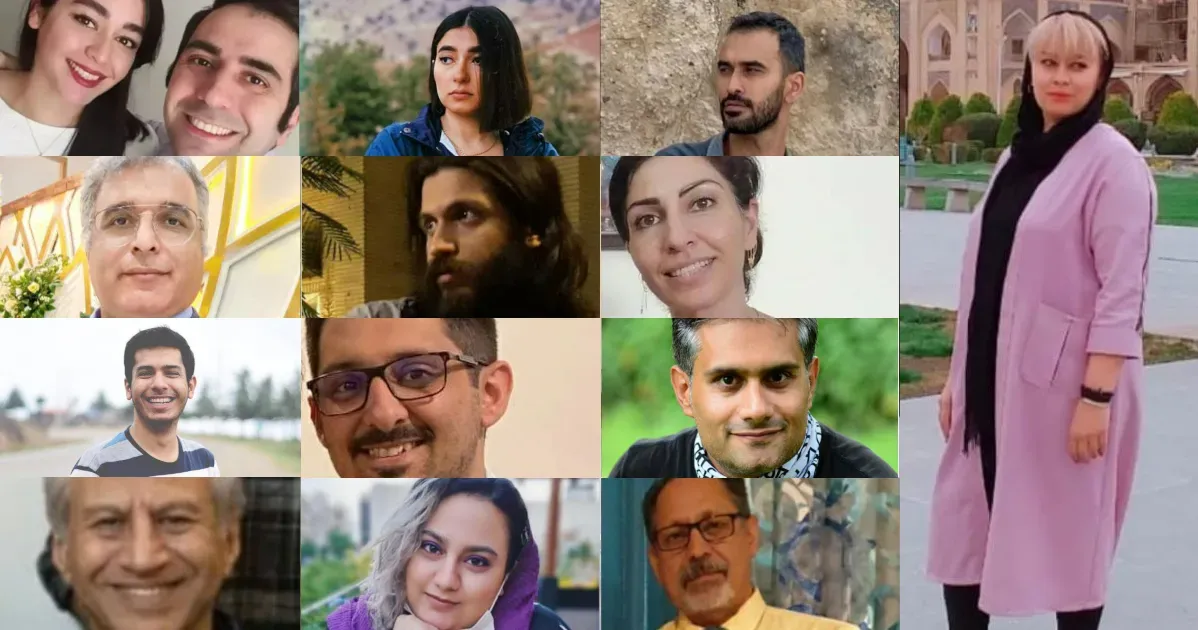Source: iranwire.com
Kian Sabeti

Many members of the Baha’i religious minority have been arrested across Iran in recent weeks amid unabated nationwide protests. Some were detained at their homes while others were rounded up with other protesters in the streets. Like many of the arrested demonstrators, these Baha’is have been locked up behind bars without specific charges and haven’t been allowed to meet with their families.
As of now, the Baha’i International Community, which represents the worldwide Baha’i community, has not yet officially commented on the new wave of arrests of Baha’is, but its representatives have used their personal social media accounts to comment about the unrest and the ensuring crackdown by the authorities.
“The grief of losing a child is a big nightmare. I plead and pray for the peace of mind for the grieving parents and for justice, equity and equality in Iran,” tweeted Padideh Sabeti, a spokeswoman for the Baha’i International Community.
“Witnessing so much pain and suffering in Iran has broken my heart, proof that people’s hearts beat for justice and equality, wherever they are,” wrote Simin Fahandej, another member of the Baha’i International Community.
43 Years of Harassment and Persecution
Members of the Baha’i community are among the most persecuted groups in Iran. From the very first days following the victory of the 1979 Islamic Revolution, they have been violently harassed by the Islamic Republic and its lackeys. The properties and the homes of many Baha’is were confiscated, their cemeteries in all Iranian cities were seized and destroyed, and Baha’i villagers were driven out of their ancestral lands.
The homes and the livestock of many of these villagers were set on fire, and some of the elderly villagers were killed by setting them ablaze. Baha’is were expelled from all government positions, academics were kicked out of educational institutions, and students were banned from higher education.
During the Iran-Iraq war in the 1980s, Baha’is served in the military, just like their fellow Iranians. A large number of them were killed, sustained serious injuries or became prisoners of war, but the Islamic Republic has not recognized any of them as “martyr,” POW or war wounded soldier, and their names were removed from the lists of the Martyrs Foundation.
For more than a decade, Baha’is have been banned from leaving Iran and none of them have been given a passport. Over the past 43 years, more than 200 followers of the Baha’i faith have been murdered and executed by the Islamic Republic. Thousands of them have served prison time because of their faith.
During the ongoing protests, security agents of the Islamic Republic have killed a number of children, but for the Baha’is that’s not something new. Forty years ago, on June 18, 1983, Mona Mahmoudnejad, a 16-year-old Baha’i girl, was executed by hanging in the southern city of Shiraz just for refusing to convert to Islam. Babak Talebi and Payman Sobhani are among other Baha’i children who have been murdered in Iran.
Persecuting the Baha’is as a Mean to Silence Protests
Misleading public opinion is one of the methods that the Islamic Republic has consistently used whenever it has been challenged by protests. In the early days of the current wave of demonstrations, the Iranian government once again resorted to this tactic to mislead public opinion and sow divisions among protesters.
In a statement on September 30, the Intelligence Ministry claimed that Baha’is “have had an extensive presence on the scenes of unrest and riots,” using this fallacious excuse to arrest three Baha’i leaders and two members of their communication team.
To back its claim, the Intelligence Ministry created fake Twitter accounts and sent messages bearing the logo of the London-based, Persian-language Iran International TV channel. In these posts, Baha’is were supposedly calling on people to take to the streets on October 14 and 15.
Baha’i International Community’s Response to Protests
After the nationwide protests started in mid-September, the representatives of the Baha’i International Community at the United Nations took action to inform the world body and the European Parliament of Iran’s brazen and brutal violations of human rights. Their activities can be seen on the English-language website of the Baha’i International Community and on the Twitter pages of their representatives.
These efforts resulted in the UN Third Committee’s November 16 draft resolution on the situation of human rights in Iran, which condemns the regime’s “brutal acts of repression and violence.” This resolution will be submitted next month to the UN General Assembly for final approval.
Perhaps the following tweet, posted in various languages by representatives of the Baha’i International Community, can be considered the unofficial position of this organization regarding the current protests:
“To see the instances of injustice and the deep anguish of so many souls in weighs heavy on every awakened conscience and fills the heart of every fair-minded observer with grief and sorrow. The time has arrived for freedom of belief, for harmony between faith and reason, for the advancement of women, for freedom from prejudice of every kind, for mutual respect between diverse peoples and nations.”
Baha’is Arrested in Recent Weeks
A number of Baha’is have been incarcerated in Iran over the past week. Some have been released; some have remained anonymous because their families are unwilling to release their names.
The list below includes the names of the Baha’is who remain under arrest:
Tehran: Sepehr Rezaei, Aida Rasti, Badie Khazei, Hami Bahadori, Arash Zamani and his wife Armaghan Zabihi Moghadam
Shiraz: Parisa Rouhi-Zadegan, Leila Karami and Saman Khadem
Kraja: Payam Vali and Pouya Sarraf (has been transferred to Shiraz)
Mashhad: Cyrus Zabihi Moghadam
Sari: Milad Sanaei
Isfahan: Parva Behdad
Other Baha’i citizens have been arrested before the current wave of protests and are still being detained in Evin and Karaj prisons, without any formal charges against them: Fariba Kamalabadi, Mahvash Shahriari, Saman Ostovar and Kamiar Habibi.
Leave a Reply